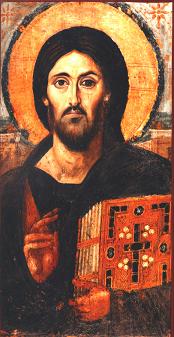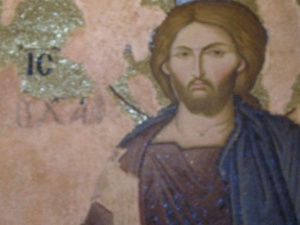Jesus Christ


Our Lord, God and Savior Jesus Christ is the incarnate Second Person of the Holy Trinity, fully God and fully man, born in time of the Virgin Mary and begotten from before all time of God the Father.
Contents
Etymology
Jesus
"Jesus" is a transliteration, occurring in a number of languages and based on the Latin Iesus, of the Greek Ιησους (Iēsoûs), itself a Hellenisation of the Hebrew יהושע (Yehoshua) or Hebrew-Aramaic ישוע (Yeshua ), (Joshua), meaning "the Lord saves". His English name Jesus is from the Greek ; which is from the Hebrew Yeshua, which means "Yahweh saves."
Christ
"Christ" is His title derived from the Greek Χριστος (Christós), meaning the "Anointed One", a translation of the Hebrew-derived Mashiach ("Messiah").[1]
The Messiah
Jesus Christ is the Messiah prophesied by the Jewish prophets of the Old Testament Scriptures. The Gospel of Matthew in particular focuses on the Jesus' fulfilment of prophecy, mainly because it was written for a Jewish audience.
Immanuel / Emmanuel
Immanuel (Hebrew עִמָּנוּאֵל) as found in the Hebrew Text of the Book of Isaiah of the Old Testament consists of two Hebrew words: אל (El, meaning God) and עמנו (Imanu, meaning with us) and therefore has the meaning "God with us." It also appears as Εμμανουηλ (Emmanuel) in Isaiah 7:14 of the Greek Septuagint, and is most notably found in Matthew 1:23 where this descriptive name is applied to Our Lord and Savior since He is "God with us."
- "Behold, a virgin shall be with child, and shall bring forth a son, and they shall call his name Emmanuel, which being interpreted is, God with us. (Matt. 1:23; KJV)
- "Therefore the Lord himself shall give you a sign; behold, a virgin shall conceive, and bear a son, and shall call his name Immanuel. (Isa. 7:14; KJV)
Notes
- ↑ A Messiah is a king anointed at God's direction or with God's approval.
See also
External Links
Icons
| This article forms part of the series Introduction to Orthodox Christianity |
|
|---|---|